Having a good roof over your head is essential when it comes to running a business, regardless of whether you’re a small-scale manufacturer or the owner of a busy warehouse. A roof can be a costly problem if left unchecked, which is why a replacement may be the best solution.
Like any significant improvement, buying a new industrial roofing can be a challenging task. Even the most organized business owners may feel confused after accounting for costs, time, and the vast selection of roofing options available. In this article, you’ll learn about what to consider before you eventually decide to replace your industrial roof on any budget.
12 Factors to Consider Before Replacing Your Industrial Roof

- Local building codes
It’s crucial that you install new industrial roofing in accordance with the local building code requirements. For instance, you can only install specific kinds of roofing if your building is located in a region with frequent storms.
For this reason, you should search for industrial roofing services that can help you deal with local building codes. Additionally, these contractors can assist you in locating an industrial roof that fits within your price range.
- Budget
Any major purchase requires a well-thought-out budget, and replacing the entire roof is no exception. Even though it can be simple to just pick the least expensive choice, this might not be the best investment for you.
On the other hand, overspending can result in a faulty installation, which will cost you money. Spend some time evaluating your needs with this in mind; this is when you’ll think about your top priority for a roof. Among the several considerations, you must make are
- Types of roofing materials available (modified bitumen, spray foam, metal roofs, built-up roofs, and more)
- Climate or environmental conditions in your location
- Extra features or improvements
- The durability of the roofing material
- Industrial roofing contractors’ installation costs
- Your choice of roofing contractors
Choosing the right contractor can make the difference between a good result and one that is full of problems. This is why it is one of the most important things to think about if you want a good roof installation.
- Go Local
Local roofing companies are always going to be the best to hire because they can more easily be on hand when you need them. A local contractor will be able to complete the work much more quickly and probably for less money than someone who has to travel great distances to come to your site with equipment, materials, and employees. Additionally, it makes it simple for you to communicate with your contractor if you have any questions, keeping you informed at every stage of the process.
- Look for reviews
In addition to asking people you know, you can do a quick search online to find many sites that review companies. Make sure to visit notable websites like Trusted Traders and Yell while conducting your search.
- Research
If you haven’t done the appropriate research to make sure they are capable of carrying out the job correctly, hiring the first roofing contractor you come across is just asking for disaster. Verifying that the contractor you’ve picked is a member of an established organization is one of the best places to start.
It may be a good idea to speak with your preferred contractor and do some additional research because there are a number of these accredited trade organizations. Affiliation with one of the groups demonstrates a dedication to providing consumers with services of the highest caliber and is a great place to start when researching your contractor.
- Slope of new roof and drainage
If you want to prevent future costly and frequent repairs, one thing you should particularly be concerned about is maintenance. Drainage issues are frequent, particularly with flat roofing systems. The way rainwater drains from a roof is often determined by its slope. Various drainage systems that are strong, easy to maintain, and safely direct water away from your structure should also be taken into account.
- Energy efficiency and savings
Each entrepreneur wants to get the most value for their buck, particularly when replacing a roof. In light of that, consider purchasing roofing material that is energy-efficient. Roofs that conserve energy help you pay less in utility costs. They effectively reflect light, which minimizes heat transfer into your building. As a result, your air conditioning systems won’t need to work as hard to maintain a pleasant interior temperature.
- Foot traffic and structural load
If you have plans to add solar panels to the top of your commercial building, you should be aware that factors like foot traffic and structural load might reduce the longevity of your roof. Even though you have an idea of the kinds of roofing materials that could be able to support structural loads, you should still consult with industrial roofing contractors to determine the best solution given your building needs and budget.
- Interruptions and noise
Remember that replacing your roof will make considerable noise and possibly interfere with your daily activities. You must inform your workers and notify everyone in your building unless you’re installing a single-ply roof, which takes less time to complete and is less disruptive.
- Maintenance
There are roofs that require a lot of upkeep and roofs that don’t. Make sure to ask industrial roofing experts to recommend a roofing system that’s long-lasting and low-maintenance based on the weather in your area.
- Lifespan of the roofing system
Consider the basic life expectancy of each type of roof while deciding on the best industrial roofing material. The basic types of roofing and their corresponding lifespans are such as
- Concrete roofing: 40 to 50 years
- Spray foam roofs: up to 50 years
- Roofing with a single ply: up to 40 years
- Metal roofs: 40 to 45 years
Just remember that these are estimates. The regularity of repairs and maintenance, the local weather, and the airflow inside your building are all significant factors that could affect how long your roof lasts.
Endnote
Contact the experts at MTM Roofing if you see any damage or believe it’s time for your industrial roof replacement. Our team of roofing experts will do a thorough inspection to figure out the best way to replace the roof. We are trained to recognize even the tiniest indications of harm so we can address issues before they get worse. We’ll give you a reasonable quote right away to spare you the inconveniences and expenses of continued damage.
The skilled roofers at MTM Roofing are here to ensure that your roofing projects are completed quickly and without additional fees. We take great pride in carrying out our work with honesty and sturdiness in mind. Contact MTM Roofing for a complimentary, no-pressure, professional estimate today.






